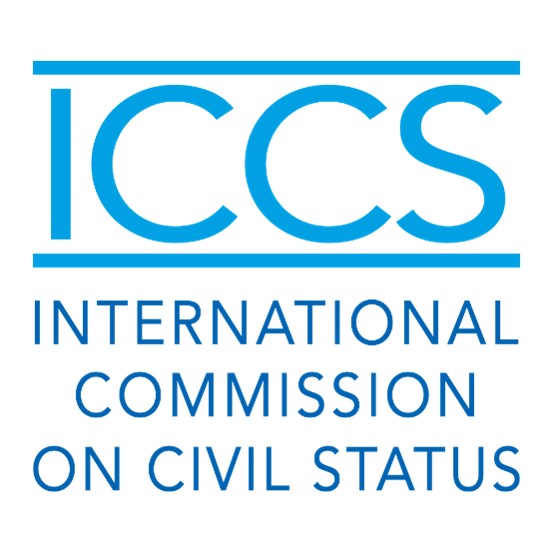Views
Nothing Found
Sorry, no posts matched your criteria
News
ICCS plurilingual forms present and future of international cooperation in civil status matters: Conference on 21 September 2022

The International Commission on Civil Status (ICCS / CIEC in French) is organising a conference on 21 September 2022 entitled: ICCS plurilingual forms Present and future of international cooperation in civil status matters.
This event is being held on the occasion of the entry into force of the Convention (n°34) relative à la délivrance d’extraits et de certificats plurilingues et codés d’actes de l’état civil for the following States: Belgium, Germany and Switzerland (as of 1 July 2022).
Speeches and discussions will be in French or English with simultaneous interpretation.
The venue of the conference is Château de Pourtalès, 161, rue Mélanie, 67000 STRASBOURG – France.
Registration is free of charge but mandatory. Interested persons should send a message to:
Below is the agenda (see also here Conference program):
8.30 am : Welcome speech
Jeannine Dennewald, President of the ICCS
8.40 am : Opening speech
Hans van Loon, former Secretary General of the Hague Conference on Private International Law
Morning session : 9.00 – 12.15 am : Improving plurilingual forms
Chair : Paul Lagarde, Emeritus professor, University Paris I, former secretary general of the ICCS
9.00 – 10.30 am : workshop n°1 : Plurilingual forms and sex of persons: same-sex couples, neutral sex and third sex
Speaker : Patrick Wautelet, Professor, University of Liège
Discussion : Dr Bojana Zadravec, President of the Slovenian Association of Administrative Staff, EVS (European Association of Registars)
10.30 – 10.45 am : break
10.45 am – 12.15 pm : workshop n°2 : Plurilingual forms and filiation: the relevance of adapting to diversity
Speaker : Olivier Guillod, Professor, University of Neuchâtel
Discussion : Hague Conference representative
12.15 – 12.30 pm : The ICCS: dynamic transition to the future
Nicolas Nord, Secretary General of the ICCS
Afternoon session : 2.00 – 6.00 pm : Optimizing the circulation of plurilingual forms
Chair : Anatol Dutta, Professor, University of Munich
2.00 – 2.30 pm : workshop n°3 : Plurilingual forms and European rights: from the public documents regulation to the recognition of situations
Speaker : Camille Reitzer, Deputy Secretary General of the ICCS
Discussion : Marie Vautravers, European Commission
3.30 – 4.00 pm : break
4.00 – 5.30 pm : workshop n°4 : Plurilingual forms, digitization and data protection: the need for a specific regime
Speaker : Guillermo Palao Moreno, Professor, University of Valencia
Discussion : ANUSCA representative – Alexander Schuster, University of Graz
5.30 – 6.00 pm : General conclusion
Andreas Bucher, Emeritus Professor, University of Geneva
Long Live the Regulation? Brussels II ter Regulation becomes fully applicable
(by Krzysztof Pacula and Thalia Kruger)
Starting from 1 August 2022, the Regulation (EU) 2019/1111 of 29 June 2019 on jurisdiction, the recognition and enforcement of decisions in matrimonial matters and the matters of parental responsibility, and on international child abduction (recast) became fully applicable, replacing the Brussels II Regulation. This Regulation is called Brussels IIter by some; Brussels IIb by others, Brussels IIbis (recast) by yet others, or simply Regulation 2019/1111 (thanks to its easy number). Brussels IIb will probably prevail, as this is the name that the Commission seems to be opting for.
“To trust or not to trust – this is the question of private international law”. M. Weller on Mutual Trust, Recueil des Cours, vol. 423 (2022)
A. Introduction
During the Summer of 2019, I attended one of the two flagship courses organised by the Hague Academy of International Law – the annual Summer Courses on Private International Law.
I quite vividly recall that, during the opening lectures, one of the Professors welcomed the participants at the premises of the Academy, a few steps from the Peace Palace itself, and made an observation that, at that time, seemed as captivating as remote.
As my precise recollection of his words may be far less accurate than the memory of the impression they made on me, I paraphrase: when it comes to education in general, in years to come – he noted – it will be a privilege to be able to benefit from a physical presence of a teacher or professor, being there, in front of you, within the reach of your hand and of your questions.
At that time, just a few months prior to the beginning of the worldwide spread pandemics, even the Professor himself most likely did not realize the extent to which his words would soon prove prophetic.
That was, however, not the sole lecture that I recall vividly.
Among others, Professor Matthias Weller (University of Bonn, one of two general editors of CoL.net) presented his course titled ‘Mutual Trust’: A Suitable Foundation for Private International Law in Regional Integration Communities and Beyond?


